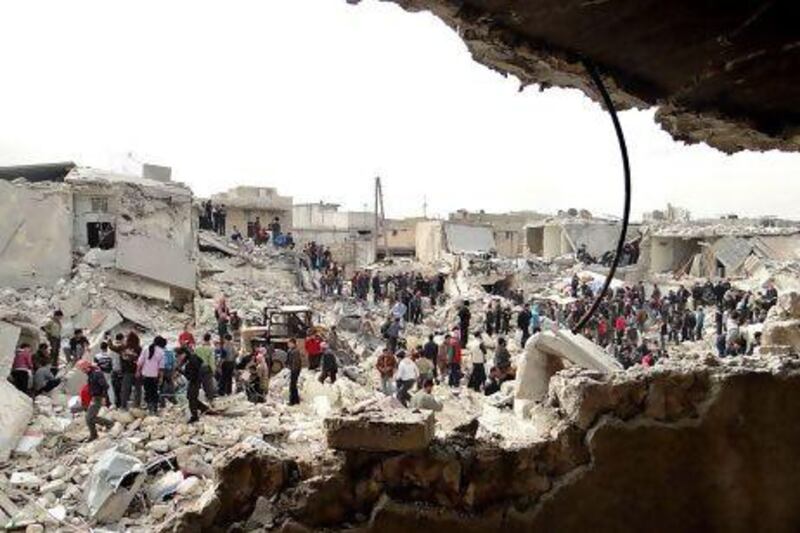NEW YORK // Syrian rebels deserve more support if Bashar Al Assad refuses to negotiate a political solution to the civil war, the new US secretary of State John Kerry said yesterday.
"If the president of the country decides he isn't going to come and negotiate and he's just going to kill his people, then you at least need to provide some support for the people who are fighting," Mr Kerry told students in Berlin.
Russia, Syria's main ally, urged Washington yesterday to steer the Syrian opposition to hold unconditional talks with the regime.
Mr Kerry has hinted at a shift in US policy to increase support for the rebels, details of which could emerge tomorrow at the Friends of Syria conference in Rome.
"We are determined that the Syrian opposition is not going to be dangling in the wind wondering where the support is or if it's coming," Mr Kerry said after a meeting with the British foreign secretary William Hague at the start of his nine-country trip to Europe and the Middle East, his first as Washington's top diplomat.
"And we are determined to change the calculation on the ground for President Assad."
The centrepiece of Mr Kerry's first diplomatic efforts abroad will be the Rome conference, which almost became an embarrassing failure before it even began after the Syrian opposition coalition said on Saturday it would boycott the talks over frustration with the West's inaction in the face of the Syrian military's continuing attacks on civilians.
After a flurry of diplomatic activity by the US state department over the weekend, the Syrian National Coalition leader Moaz Al Khatib said the opposition leadership would attend the meeting with western supporters.
Averting the opposition boycott put Mr Kerry in a stronger position before his meeting in Berlin yesterday with his Russian counterpart, Sergey Lavrov. US state department spokeswoman Victoria Nuland said the discussed how they could implement the so-called Geneva Agreement, which is designed to get the Syrian government and rebels to plan a transitional government for the time after Mr Al Assad leaves office.
Before leaving for Berlin yesterday, Mr Lavrov said he would urge the US to press the Syrian opposition to hold direct talks with Mr Al Assad, and without the condition that he relinquish power.
But he added that prospects for talks were growing dimmer because "extremists", including the main opposition group, the SNC, "block initiatives to start dialogue".
On a visit to Moscow on Monday, Syria's foreign minister Walid Al Moallem appeared to call for just such a dialogue with the rebels, saying Damascus was "ready for a dialogue with anyone who's willing, even with those who carry arms".
It was the first time a senior Syrian official had said the government was willing to talk with the rebels.
It was unclear whether the regime would demand that the rebels cease fighting as a condition, but increased lethal assistance would probably be the opposition's main demand at the meeting in Rome.
The US and its European allies have so far refused to include weapons in their aid to Syrian rebels because they fear some rebel groups are allied with Al Qaeda. But the US administration is coming under increasing domestic pressure from both parties in Congress to begin directly arming rebels who are moderate nationalists.
"We know who they are, and I think it's time we made that move," Eliot Engel of New York, a senior Democrat on the House foreign affairs committee, said on Sunday.
Reports in recent days suggest that Saudi Arabia is stepping up shipments of powerful weapons procured in Croatia to moderate Syrian rebels in the south of the country, via Jordan.
US officials told The New York Times that the decision to increase the supply of infantry weapons, including recoilless rifles and anti-tank rockets, was based on fears by the US and its European and Arab allies that well-equipped militant groups were becoming increasingly influential among the opposition fighters.
It remains unclear if Washington has played any role in the increased flow of weapons or in vetting which rebel groups are deemed eligible to receive them.
The latest UN estimates for the number of refugees who have fled the country stands at 925,908, with hundreds of thousands more who never registered as refugees.





